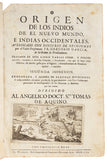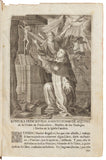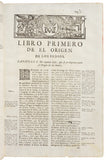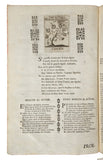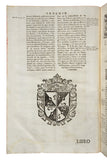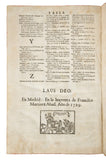Origen de los Indios de El Nuevo Mundo, e Indias Occidentales
Author: Gregorio Garcia (1554-1633?) and Gonzalez de Barcia
Year: 1729
Publisher: Francisco Martinez Abad
Place: Madrid
Description:
[32]+336+[80 index] pages with vignette title page, showing ships approaching a coast; engraved portrait of Thomas Aquinas and 5 small engravings in the text. Small folio (11 3/4" x 7 3/4") bound in period sheep, spine tooled in gilt, raised bands, morocco lettering piece, marbled endpapers. (Medina IV, 2713; Borba de Moraes I, 346; Sabin, 26567) Second edition.
This work was originally published in 1607 and reissued in 1627 with additions by Gonzalez de Barcia and was originally anonymous. The anonymous 1729, or "pseudo-Garcia," as it is sometimes called, also reuses the old legends of Atlantis, Carthage, and the Hesperides, and is proceeded by supposed cultural and physiological analogies.
It takes advantage of Kircher's speculations, inclined towards Christian orthodoxy, to devalue Eastern cultures. Feijoo proceeds like the reeditor in attacking the preadamismo of Isaac de La Peyrre that affirmed that God had created men before Adam and that only the Hebrews descended from this one [1655]. Chapter XXIV of the Origin of the Indians, totally added in 1729 and headed "other views on the origin of the Indians and the most consistent intends" [1729: 248], begins attacking polygenism Paracelsus and pre - Adamite Isaac de La Peyrre. Having been announced by the reeditor who was to enrich the book with "more modern" authors, he incorporates texts by Juan de Laet and Georg Horn, both of which are placed by the author of the second printing, in the same reformist line as the first. Among the authors are added Solorzano Pereyra (indiana Politics, 1647), Hugo Grotius, and Athanasius Kircher (Oedipo egiptiano, 1652; Underground World, 1665). Grotius proposed the Ethiopian descent of the Indians of Yucatan, while certain so-called reformists claimed a settlement of America by the north through Greenland; It should be added that the polygenism of Paracelsus and La Peyrre also supported an initial dual or multiple creation.
Condition:
Rubbing to covers, some small surface gouges; pages 295-6 with lower corner torn off affecting text else good.










